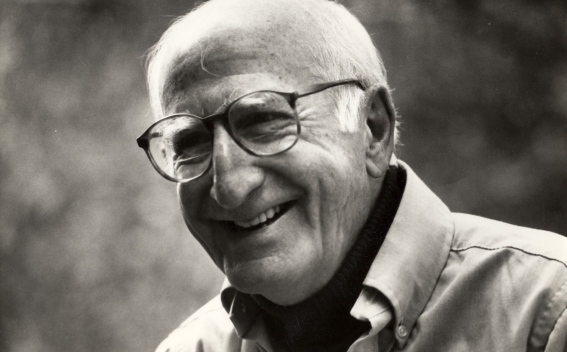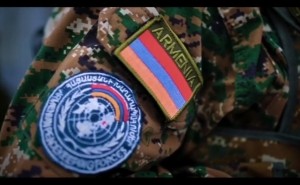Ben Baghdikian, Armenian Journalist Who Publicized Pentagon Confidential Papers

Ben Haig Bagdikian, a prominent American media critic, a professional journalist and educator, professor and Honorary Dean at the University of California journalism school, in the city of Berkeley, most renowned journalistic Pulitzer Prize winner, president of the Washington-based American Washington Post Bureau, later in the same local newspaper chief editor of the domestic news, and later, international correspondent.
Ben-Hur Haig Bagdikian was born in Marash, Western Armenia, on January 30, 1920. A survivor of the Armenian Genocide, his family moved to the United States, Massachusetts. His father was a pastor at several Armenian churches in the Boston area. He had taken courses at the Harvard Divinity School and had been ordained. His mother was diagnosed with tuberculosis almost immediately after arrival in Boston and died three years later, after spending some time hospitalized in sanitariums.
After graduating from the University of Clark in 1941, Ben began working in the “Morning Union” newspaper. During the WW II when the Japanese attacked the Pearl Harbor, he was recruited to the US Air Force to serve until the end of the war.
His journalistic career began after the war. Throughout his lifetime Ben was fighting for justice. He became a crypto prisoner for disclosing inhuman jail conditions in Pennsylvania. In 1956 he joined the Israeli tank crew to write about the Suez crisis. In the 1960s, Baghdikyan lived with the ordinary people in the South of America to cover civil rights. In the 1960s Baghdikyan was employed in the prestigious American Washington Post. In the 1970s he was the chief editor of the periodical. Ben Baghdikian's reputation was growing in those years.
It is he who initiated a series of scandalous publications in the Washington Post entitled "Pentagon Documents" about the Vietnam War. Those confidential documents for use by the US Department of Defense documented that the administration of the US President Lyndon Johnson intentionally escalated the war in Vietnam. With the release of these documents, a large anti-war wave broke out that led to the end of Vietnam War in 1973.
Ben Baghdikyan also collaborated with New York Times, Boston Globe, Fortune, Time and other Western American magazines as he worked in Washington Post. Moreover, he also wrote articles in Armenian periodicals published abroad.
Throughout his career, Baghdikyan fought against newspapers that disseminated fake news. In 1975, when the newspapers hired by the Turks began to spread false stories about the "Armenian Cause", Baghdikyan directed all his professional potential and made the editor of one of those periodicals publicly apologize for the fake news they published.
In addition to the articles, Ben authored a number of books. One of his most popular books, “The Media Monopoly”, narrates how several US companies took control of most of the media.
Remarkable are also his "I am Armenian", "Ben Bagdikyan, journalist for justice" books, where he tells about the Armenian Genocide and his life journey.
Ben Baghdikyan died on March 11, 2016, at the age of 96. Besides the prestigious Pulitzer and Peabody prizes, Bagdigian also won the "Most Popular Critic in the Field of Journalism", as well as the James Madison Award.
Ben Baghdikian's appeal to media outlets is remarkable. "Never forget that you are responsible in front of the people. You don’t work for those who pay, neither for your sources, editors, friends, nor for your careers. You work for your audience.”
Other materials on this subject
- Alenush Teryan: Iran’s First Female Astronomer and Founder of First Solar Observatory “My daughter’s name is sun, my son’s name is moon”, would say Iran’s first astronomer and founder of the first solar observatory Alenush Teryan.
- Armenian Hakob Martayan - the Founder of the Modern Turkish Language When Kemal Ataturk decided to implement a reform of the Turkish language and translate the Ottoman-Turkish language (Osmanli) from Arabian into the Latin alphabet, he requested Hakob Martayan to do the...
- Asatour Sarafian, the Inventor of Automatic Transmission For Automobiles Asatour Sarafian, was an Armenian American inventor who patented a number of works, including an automatic transmission for automobiles, the needleless inoculation gun, the primary controls of the first...
- Alexander Leonovich Kemurdzhian, Designer of the First Planet Rover The mission of Kemurdzhian’s life was the design of space technology and participation in the design of the world's first automatic self-propelled apparatus for research on the lunar surface.
- Armenian Anita Caracotchian: The First Female Oceanographer in the World “A part of my people lived at the sea for 300 years, we had glorious Cilicia, that harbored more than one thousand Armenian ships having tight commercial ties with the most powerful countries. After...
-
 17:08
17:08The regular session of the Anti-corruption Policy Council takes place in Jermuk
-
 15:05
15:05The Prime Minister sends congratulatory messages to the supreme leader of Iran and the President of Iran
-
 11:11
11:11Armenia sends earthquake aid to Turkey
-
 10:43
10:43Commemoration of the Pontiff St. Sahak Partev
-
 09:16
09:16Some roads are closed and difficult to pass in Armenia
-
 19:55
19:55Phone conversation of the Foreign Minister of Armenia with the U.S. Assistant Secretary of State for European and Eurasian Affairs
-
 18:30
18:30Prime Minister Pashinyan and President Khachaturyan meet
-
 18:20
18:20Ararat Mirzoyan with Co-Chairman of the OSCE Minsk Group of France Brice Roquefeuil
-
 17:01
17:01Humans could land on Mars within 10 years, Musk predicts
-
 16:45
16:45France, US urge 'immediate' end to Nagorno Karabakh blockade
-
 16:01
16:01Blockaded Nagorno Karabakh launches fundraiser to support quake-hit Syria
-
 15:59
15:59Earthquake death toll in Turkey rises to 18,342
-
 15:43
15:43Ararat Mirzoyan Held a Telephone Conversation with Sergey Lavrov
-
 15:06
15:06French president rules out fighter jet supplies to Ukraine in near future
-
 14:47
14:475 Day Weather Forecast in Armenia
-
 14:44
14:44President Vahagn Khachaturyan wrote a note in the book of condolences opened in the Embassy of Syria in Armenia
-
 14:20
14:20Azerbaijan’s provocations impede establishment of peace and stability – Armenian FM tells Russian Co-Chair of OSCE MG
-
 12:57
12:57France representation to OSCE: Paris calls on Azerbaijan to restore freedom of movement through Lachin corridor
-
 11:40
11:40Command of Kosovo forces highly appreciated preparation of Armenian peacekeepers
-
 10:16
10:16The United States withdrew from sanctions against Syria for six months the provision of assistance after the earthquake
day
week
month
Humidity: %
Wind: km/h









